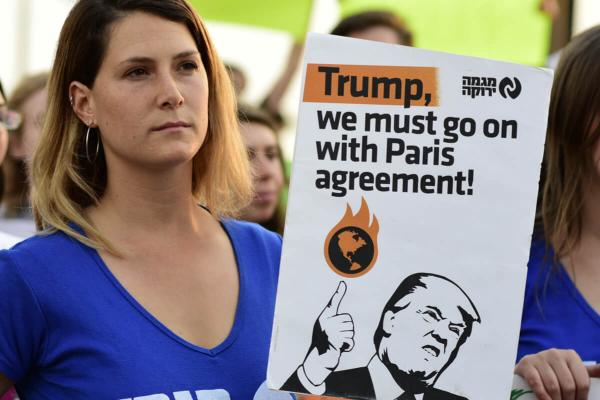FOR MANY OF US, how people treat the Earth goes far deeper than “politics.” Our relationship with God’s creation is, at heart, a theological matter.
The Paris climate accord is not perfect—it does not go far enough and it is not binding. Nevertheless, it was a giant step forward to have 195 countries commit to curbing the carbon emissions that are endangering the planet and the people who live on it, especially the poorest and most vulnerable. That step was very important, the result of decades of hard work and diligent diplomacy.
Therefore, Donald Trump’s decision to withdraw the United States from the agreement is a theological failure and an abdication of American leadership on perhaps the most important crisis facing the world today. Politically, it was enormously shallow, arrogant, and truth-less: three words that sadly characterize many of the bombastic statements and decisions the administration has made.
Trump’s slogan “America First” is also a theological problem, at least for religious communities that see God’s creation and children in a global way. Practically speaking, to think that one can protect the environment and ourselves with an “America first” strategy is simply not true. My teenage boys understand that climate change does not obey national boundaries, but the White House doesn’t seem to have figured that out.
By announcing that the United States will withdraw from the Paris accord, Trump chose to isolate the U.S. on an issue on which there is nearly unprecedented global consensus. The president’s America First ideology—especially as personified by his chief strategist, Stephen Bannon, and his EPA administrator, Scott Pruitt—outweighed the advice of every other major world leader, the heads of large corporations, the scientific community, religious leaders from every major tradition (including Pope Francis), and even members of Trump’s own family.
PRESIDENT TRUMP has decided that the U.S., the world’s second largest polluter (behind China), will play virtually no role in the global fight against climate change between now and 2021. The question for people of faith, conscience, and good will is: What can we do? Fortunately for our common home, there are many leaders and grassroots activists in every sector of society who are already providing answers to that question.
The political leaders of many states and cities have decided that they will abide by the Paris accord even if the federal government will not. Governors and mayors across the country—representing California, Hawaii, New York City, Pittsburgh, and many more—are formally committing their cities and states to reaching Paris agreement emissions targets.
After Trump announced that he represents “Pittsburgh, not Paris,” the Pittsburgh mayor said Trump does not represent the people of his city and that Pittsburgh will defy Trump’s decision. Large companies headquartered in the U.S. are doing the same. In fact, within days of Trump announcing the Paris withdrawal, 1,219 governors, mayors, businesses, investors, and colleges and universities promised that “we are still in” the battle against climate change and still committed to the Paris accord global targets. That coalition will continue to grow to fill the vacuum left by the federal government.
Of course, religious leaders and people of faith from every tradition also have a critical role to play. For us, God’s instructions in scripture to care for creation take precedent over national borders or isolationist presidents.
Many religious leaders raised their voices, both before Trump announced the withdrawal decision and since then. Christians, Jews, Muslims, Buddhists, Hindus, and Sikhs, as well as people of conscience who don’t ascribe to any faith—all of these recognize a responsibility on the part of human beings to care for, preserve, and steward the natural world and its resources in a responsible way.
AS CHRISTIANS, we need to make it a top priority to care for God’s creation and the abundance it is meant to provide for all of God’s children—especially the poorest and most vulnerable—now and in future generations. In some cases, that may mean denominations, congregations, and churches officially pledging to meet Paris targets with their own facilities and operations. It should also mean continued pressure on political leaders at the local, state, and federal levels to commit to the goals.
We need to continue to make the moral and spiritual case for global climate action and environmental justice. As God’s children, we are called to treat the Earth—our only home and a sacred gift from our Creator—with the love and respect it deserves.

Got something to say about what you're reading? We value your feedback!

